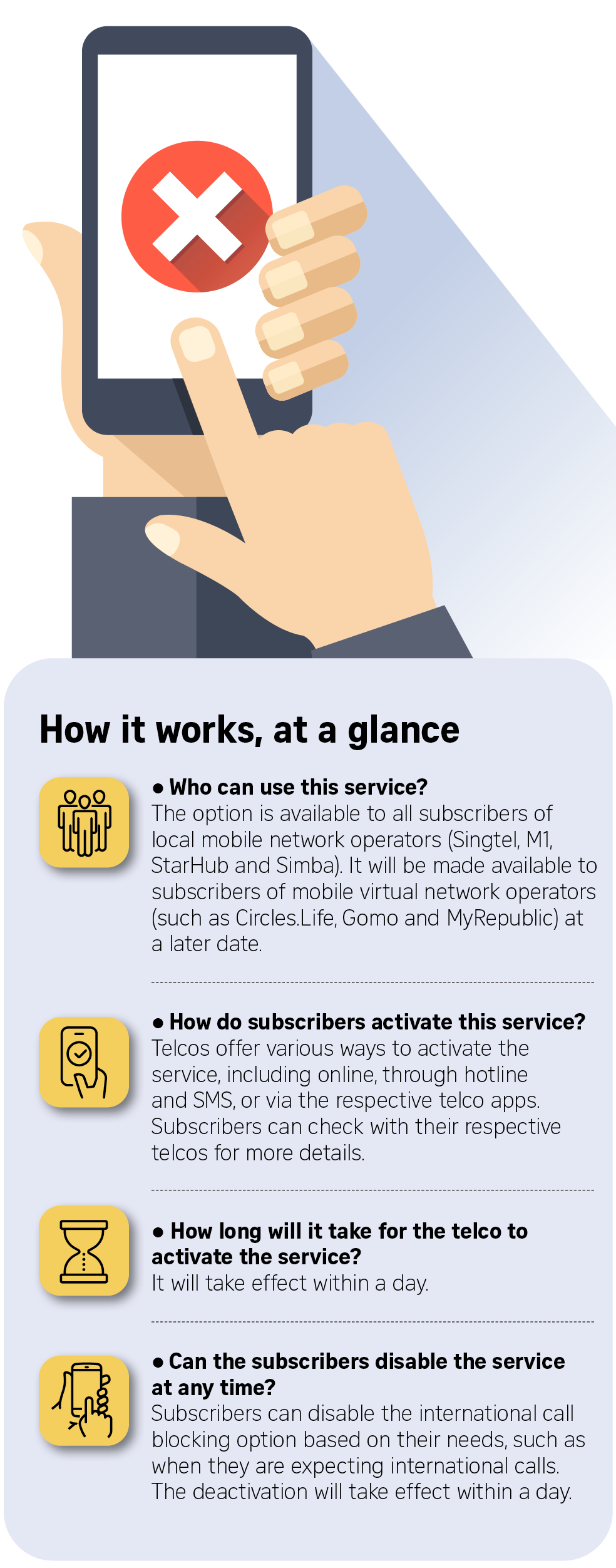BRANDED CONTENT
Tired of scam calls from overseas? This new measure lets you take a preventive stance
Subscribers of local telcos can now block all international calls on their mobile phones for free

Subscribers can disable the international call blocking option based on their needs, such as when they are expecting international calls.
PHOTO: GETTY IMAGES
Kareyst Lin, Content STudio
Follow topic:
Over the past year, Ms Deanna Lim has developed a new habit: She doesn’t pick up phone calls from unknown numbers anymore.
“If it’s anything urgent, I’m sure the caller would use other methods (such as text message or email) to contact me,” the 29-year-old financial consultant says.
Why does she not want to find out who’s calling?
Ms Lim shares that in her experience, such unsolicited calls are almost always an automated voice message in a non-local accent, claiming to be from a bank or government agency. She receives these “annoying calls” up to twice a week.
“Having read about the various types of scams in the news recently, it’s quite obvious to me that these calls are scam attempts.”
Ms Lim’s cautious approach reflects a growing concern in Singapore, where phone calls remain one of the top ways through which scammers contact victims.
More on rising scams in Singapore
- Singapore Police Force (SPF) figures reveal that 4,516 residents fell prey to e-commerce scams in the first half of 2023 – the second-highest number of reported cases among all scam types.
- Government impersonation scams are on the rise, and these scams have the highest average losses at about $116,000.
The Singapore Police Force (SPF) reveals that there were 24,525 scam cases reported in the first half of last year – a 64.5 per cent increase from the same period in 2022. Of these, 17.5 per cent involved contact via phone calls.
Ms Lim estimates that about 30 per cent of the unsolicited calls she receives are from international numbers. They carry prefixes such as “+81” (the Japan country code) and “+44” (the United Kingdom country code).
Since April 2020, all international incoming calls have been prefixed with a plus sign (+) to help Singapore residents better identify potential scam calls.
All international calls pretending to be local numbers with the “+65” prefix have also been blocked by the Infocomm Media Development Authority (IMDA) and local telecommunication operators since December 2020.
As a result, most scammers have shifted tactics, says Mr Tan Fong Chin, director of IMDA’s Network Project Office. They now use international numbers and other communication platforms like WhatsApp and Telegram to contact their victims instead.
New anti-scam measure
To fight the rising tide of scam calls, the Singapore authorities introduced a new measure on Friday: The option to block all calls from international numbers on mobile phones.
The free service is available to all subscribers of local mobile network operators – Singtel, M1, StarHub and Simba.
It’s a welcomed relief for Ms Lim, who is a StarHub subscriber. “(The new measure) will definitely be helpful in reducing unwanted spam calls.”
Calls made from local numbers (such as by Singapore users who are travelling overseas and calling home) will still be received and will reflect the “+65” prefix, says the IMDA spokesman.
Currently, measures have been taken by telcos at the network level to identify and block calls that are known to be scams. These include:
- Calls that are masquerading as specific government agencies or organisations, or those that have been blacklisted by IMDA
- Calls that are made using computerised systems and exhibit unusually high calling frequency, also known as robocalls
- All international calls pretending to be Singapore numbers (beginning with “+65”). Calls made from local numbers, such as by Singapore users who are travelling overseas and calling home, will still be received and will reflect the “+65” prefix
IMDA notes that the measures have helped reduce the exposure of Singapore residents to scam calls, with more than 300 million calls blocked by telcos preventively between Jan and Sept last year.
This translates to one in every four incoming calls from international numbers blocked.
The new measure aims to manage the residual risk of scams.
IMDA’s Mr Tan explains: “While the existing measures have been effective in blocking (incoming international calls that are pretending to be) Singapore numbers, scammers may still attempt to contact their victims with calls made from or appearing to be made from other countries.
“The latest measure goes a step further to protect users by allowing them to choose whether they want to continue receiving calls from international numbers at all.”
IMDA is working with local telcos to extend this option to block SMSes from international numbers by mid-2024.
“While the Government continues to roll out measures such as the option to block international calls, a vigilant and discerning public remains key to protecting everyone against scams,” says Police Superintendent Matthew Choo, Scam Public Education Office, SPF.

This is part of a series titled "Act against scams", in partnership with the Singapore Police Force.

